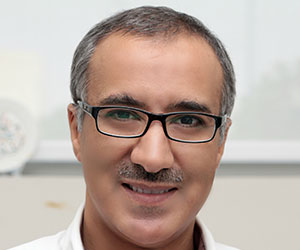Using AI to control energy for indoor agriculture
30 September 2024
Published online 13 December 2016
The upcoming generation of Arab scientists has to be mentored differently, says Mohamed Boudjelal.
This piece was cross-posted with Nature Jobs

The majority of the Arab world gained independence from western colonization during the second half of the 20th century. While Western states were building their research base then, most Arab states were focused on education. Now, the Arab world is trying to catch up. The two main challenges we face today are improving scientific training, and engaging more women in science.
Whilst there are differences in the way women scientists are mentored and treated in Western countries, these are not as pronounced as in the Arab world. The social norms in some Arab states may prevent women scientists from traveling overseas alone, for example. In the workplace, mentors sometimes need to provide women-only common areas for privacy purposes.
This serves as an example of the importance of understanding the unique culture of the Arab world. Before embarking upon collaborations with researchers from the region, scientists need to be aware of these differences.
Scientists who seek to become successful academic mentors in the Arab world also need to show that they’re working in the best interests of their respective host countries. Part of that is making sure to offer the best possible advice to students.
Providing proper training programmes to junior scientists early on should be another focus of mentors. Training could come in the form of intensive courses on rigor and discipline in research, experimental techniques, reviewing the literature, writing research grants, and how to publish and file for patents. Where students have limited English, mentors should arrange intensive courses to help them improve.
Often in the Arab world, junior researchers are judged heavily by whether or not they’ve trained overseas. Supervisors should utilize their connections when possible to provide their students with overseas experience when necessary, but should also focus on challenging the view that scientists learn science elsewhere.
The Arab culture tends to value trust over competency. Being trusted as a supervisor from both your students and superiors is a key element of success in academics here, and can open the door to more resources.
As in other regions, supervisors in Arab states may find themselves under pressure to allow for nepotism, such as admitting underperforming students. Refusing to cooperate can cause hardships and administrative issues. Nevertheless, supervisors should find the courage to fail underperformers when necessary — this is for the greater good, and will preserve the integrity of the academic sphere.
Mentors need to act as career coaches, and they should have enough connections and networks locally and internationally to be able to direct struggling candidates to career development programmes or into other productive fields of employment. These networks can work as a safety net for both supervisors and their students.
Of course, these issues should be avoided early on. The selection process for PhDs is vital; candidates should go through a formal interview in which they present their work and meet members of the team they’ll work with. The responsibility of choosing a candidate should be based on the views of the majority, rather than just the lab head.
Many of these problems are not unique to the Arab world, but the unique challenge we face is making sure that the growth of our research infrastructure continues, whilst we nurture a culture that respects the integrity of the research process, from individual mentors up to the societal level.
Those who work hard and achieve should be rewarded, and students must be given individual responsibility in line with elsewhere in the world. Once mentors enforce a healthy scientific culture, word will spread and they will be approached only by those who want to achieve.
Dr Mohamed Boudjelal is the Chairman of Medical Core Facility and Research Platform, Leader of Drug Discovery Unit at King Abdullah International Medical Research Center, King Saud Bin Abdulaziz University, Ministry of National Guard Health Affairs. He is also an initiator and first president of the Algerian Competences Association and President of Science Edit for the Developing World, www.sciencedit-dw.org.
doi:10.1038/nmiddleeast.2016.216
Stay connected: